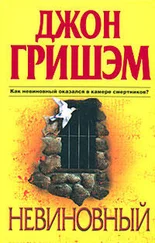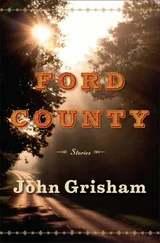“I’m Luke,” I said, though it was an odd time to make introductions.
“I’m Libby,” she said, with a smile that made my heart race. Her baby was asleep. He had not grown much since I’d seen him in the window the night he was born. He was tiny and wrinkled and likely hungry, but Gran was waiting for him.
Rayford Latcher came aboard and sat as far away from me as possible. He was one of the three who’d beaten me the last time I was on their property. Percy, the oldest boy and the ringleader of that assault, was hiding on the porch. Two more children were put into the boat, then Mr. Latcher jumped in. “We’ll be back in a few minutes,” he said to Mrs. Latcher and the others still on the porch. They looked as if they were being left to die.
The rain hit fast, and the winds shifted. Pappy and my father paddled as hard as they could, but the boat barely moved. Mr. Latcher jumped into the water, and for a second he completely vanished. Then he found his footing and stood up, covered from the chest down in water. He grabbed a rope attached to the bow and began pulling us down the road.
The wind kept blowing us into the cotton, so my father crawled out of the boat and began pushing from the rear. “Watch for snakes,” Mr. Latcher warned again. Both men were soaking wet.
“Percy almost got bit by one,” Libby said to me. “It floated up on the porch.” She was leaning over the baby, trying to keep him dry.
“What’s his name?” I asked.
“Don’t have one yet.”
I’d never heard of such nonsense. A baby without a name. Most of the ones born into the Baptist Church had two or three names before they ever got into the world.
“When’s Ricky coming home?” she whispered.
“I don’t know.”
“Is he okay?”
“Yes.”
She seemed anxious for any news about him, and this made me uncomfortable. However, it was not unpleasant sitting next to such a pretty girl who wanted to whisper to me. Her younger siblings were wild-eyed with the adventure.
As we neared the road, the water became shallow and the boat finally hit mud. We all scrambled out, and the Latchers were loaded into our truck. Pappy got behind the wheel.
“Luke, you stay with me,” my father said. As the truck backed away, Mr. Latcher and my father turned the boat around and began pushing and pulling it back to the house. The wind was so strong they had to lean into it. I rode alone, with my head bowed, trying to stay dry. The rain came down in cold pellets that grew harder by the minute.
The lake around the house was churning as we drew close. Mr. Latcher pulled the boat in again and began yelling instructions to his wife. A small Latcher was handed down from the porch and almost dropped when a gust of wind hit the boat and knocked it away. Percy thrust forward a broom handle, which I grabbed to help pull the boat back to the porch. My father was yelling this and that, and Mr. Latcher was doing the same. There were four remaining children, and all of them wanted to board at once. I helped them in, one at a time. “Steady, Luke!” my father said a dozen times.
When the children were in the boat, Mrs. Latcher flung over a burlap sack stuffed with what appeared to be clothing. I figured it was a collection of their only possessions. It landed at my feet, and I clutched it as if it had a lot of value. Next to me was a shoeless little Latcher girl — not a one of them had shoes — with no sleeves on her shirt to cover her arms. She was freezing, and she clung to my leg as if she might be taken away by the wind. She had tears in her eyes, but when I looked at her she said, “Thank you.” Mrs. Latcher climbed in, stepping among her children, yelling at her husband because he was yelling at her. With the boat fully loaded and all the Latchers accounted for, we turned around and headed back toward the road. Those of us on board cowered low to shield our faces from the rain.
My father and Mr. Latcher labored furiously to push the boat against the wind. In places they were only knee-deep in water, but within a few steps it would be up to their chests, making it hard for them to get any leverage. They fought to keep us in the center of the road and out of the cotton. The return leg of our little voyage was much slower.
Pappy wasn’t waiting. He had not had enough time to drop off the first load and come back for the second. When we got to the mud, my father tied Mr. Jeter’s johnboat to a fence post, then said, “No sense waitin’ here.” We trudged through more mud and fought the wind and rain until we came to the river. The Latcher children were terrified of the bridge, and I’d never heard such bawling as we crossed over. They clung to their parents. Mr. Latcher was now carrying the burlap sack. Halfway over the St. Francis, I looked down at the planks in front of me and noticed that, like her children, Mrs. Latcher had no shoes.
When we were safe on our side of the river, we saw Pappy coming to get us.
Gran and my mother were waiting on the back porch, where they had set up a makeshift assembly line of sorts. They welcomed the second wave of Latchers and directed them to the far end of the porch, where there was a pile of clothes. The Latchers stripped down, some concerned about privacy, others not, and got dressed in Chandler hand-me-downs that had been in the family for decades. Once outfitted in dry, warm clothing, they were ushered into the kitchen, where there was enough food for several meals. Gran had sausage and country ham. She’d made two pans of homemade biscuits. The table was covered with large bowls filled with every vegetable my mother had grown in the last six months.
The Latchers packed around the table, all ten of them — the baby was asleep somewhere. For the most part they were silent, and I couldn’t tell if it was because they were ashamed or relieved or just downright hungry. They passed around the bowls and occasionally said thanks to one another. My mother and Gran poured tea and made a fuss over them. I observed them from a doorway. Pappy and my father were on the front porch, sipping coffee and watching the rain dwindle down.
When the meal was well under way, we drifted to the living room, where Gran had built a fire in the fireplace. The five of us sat close to it, and for a long time we listened to the Latchers in the kitchen. Their voices were muted, but their knives and forks rattled away. They were warm and safe and no longer hungry. How could people be so poor?
I found it impossible to dislike the Latchers anymore. They were folks just like us who’d had the misfortune of being born sharecroppers. It was wrong of me to be scornful. Besides, I was quite taken with Libby.
I was already hoping that perhaps she liked me.
As we were basking in the satisfaction of our goodness, the baby erupted from somewhere in the house. Gran jumped to her feet and was gone in a flash. “I’ll see about him,” I heard her say in the kitchen. “You finish lunch.”
I didn’t hear a single Latcher move from the table. That baby had been crying since the night he was born, and they were used to it.
We Chandlers, however, were not. It cried all the way through what was left of lunch. Gran walked the floor with it for an hour as my parents and Pappy moved the Latchers into their new accommodations in the loft. Libby returned with them to check on the baby, who was still bawling. The rain had stopped, so my mother took it for a walk around the house, but the outdoors did nothing to satisfy it. I had never heard anything cry so violently without end.
By mid-afternoon we were rattled. Gran had tried several of her home remedies, mild little concoctions that only made matters worse. Libby rocked the baby in the swing, with no success. Gran sang to it as she waltzed around the house; more bawling, even louder, I thought. My mother walked the floor with it. Pappy and my father were long gone. I wanted to run and hide in the silo.
Читать дальше












